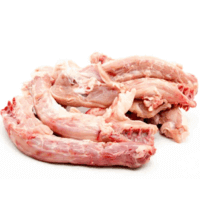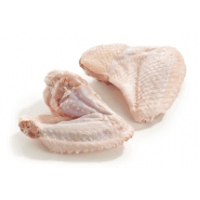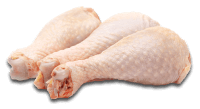Turkey neck nutrition: calories, carbs, GI, protein, fiber, fats
Turkey from whole, neck, meat only, raw
Top nutrition facts for Turkey neck
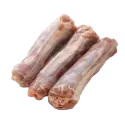
| Calories ⓘ Calories for selected serving | 566 kcal |
|
Glycemic index ⓘ
Source: *Explanation
Check out our Glycemic index chart page for the full list.
|
0 (low) |
| Net Carbs ⓘ Net Carbs = Total Carbohydrates – Fiber – Sugar Alcohols | 0 grams |
| Default serving size ⓘ Serving sizes are mostly taken from FDA's Reference Amounts Customarily Consumed (RACCs) | 1 oz (28.35 grams) |
| Acidity (Based on PRAL) ⓘ PRAL (Potential renal acid load) is calculated using a formula. On the PRAL scale the higher the positive value, the more is the acidifying effect on the body. The lower the negative value, the higher the alkalinity of the food. 0 is neutral. | 10.5 (acidic) |
| Oxalates ⓘ Animal products do not contain oxalate. | 0 mg |
Cholesterol ⓘHigher in Cholesterol content than 91% of foods
Zinc ⓘHigher in Zinc content than 73% of foods
Protein ⓘHigher in Protein content than 68% of foods
Vitamin B3 ⓘHigher in Vitamin B3 content than 67% of foods
Vitamin B12 ⓘHigher in Vitamin B12 content than 67% of foods
Turkey neck calories (kcal)
| Calroies for different serving sizes of turkey neck | Calories | Weight |
|---|---|---|
| Calories in 100 grams | 125 | |
| Calories in 1 oz | 35 | 28.35 g |
| Calories in 1 lb | 566 | 453 g |
Turkey neck Glycemic index (GI)
Source:
*Explanation
Check out our Glycemic index chart page for the full list.
Mineral coverage chart
Mineral chart - relative view
Vitamin coverage chart
Vitamin A:
177µg of 900µg
20%
Vitamin E:
1.6mg of 15mg
11%
Vitamin D:
4.1µg of 20µg
20%
Vitamin C:
0mg of 90mg
0%
Vitamin B1:
0.69mg of 1mg
58%
Vitamin B2:
2.9mg of 1mg
221%
Vitamin B3:
67mg of 16mg
418%
Vitamin B5:
11mg of 5mg
218%
Vitamin B6:
4.9mg of 1mg
381%
Folate:
68µg of 400µg
17%
Vitamin B12:
24µg of 2µg
997%
Choline:
734mg of 550mg
133%
Vitamin K:
0µg of 120µg
0%
Vitamin chart - relative view
Macronutrients chart
Protein:
Daily Value: 150%
74.8 g of 50 g
74.8 g (150% of DV )
Fats:
Daily Value: 42%
27.4 g of 65 g
27.4 g (42% of DV )
Carbs:
Daily Value: 0%
0 g of 300 g
0 g (0% of DV )
Water:
Daily Value: 17%
343.9 g of 2,000 g
343.9 g (17% of DV )
Other:
6.9 g
6.9 g
Protein quality breakdown
Tryptophan:
2392mg of 280mg
854%
Threonine:
8154mg of 1,050mg
777%
Isoleucine:
6428mg of 1,400mg
459%
Leucine:
15547mg of 2,730mg
569%
Lysine:
18523mg of 2,100mg
882%
Methionine:
5871mg of 1,050mg
559%
Phenylalanine:
7230mg of 1,750mg
413%
Valine:
7176mg of 1,820mg
394%
Histidine:
6088mg of 700mg
870%
Fat type information
Saturated fat:
7.5 g
Monounsaturated fat:
8.3 g
Polyunsaturated fat:
6.7 g
All nutrients for Turkey neck per selected serving size (1 lb - 453g)
| Nutrient | Value | DV% | In TOP % of foods | Comparison |
| Vitamin A | 59µg | 7% | 47% | |
| Calories | 566kcal | 28% | 66% |
2.7 times more than Orange
|
| Protein | 75g | 178% | 32% |
5.9 times more than Broccoli
|
| Fats | 27g | 42% | 47% |
5.5 times less than Cheese
|
| Vitamin C | 0mg | 0% | 100% |
N/A
|
| Net carbs | 0g | N/A | 75% |
N/A
|
| Carbs | 0g | 0% | 100% |
N/A
|
| Cholesterol | 521mg | 174% | 9% |
3.2 times less than Egg
|
| Vitamin D | 1.4µg | 14% | 50% |
7.3 times less than Egg
|
| Magnesium | 68mg | 16% | 73% |
9.3 times less than Almonds
|
| Calcium | 109mg | 11% | 49% |
5.2 times less than Milk
|
| Potassium | 602mg | 18% | 75% |
1.1 times less than Cucumber
|
| Iron | 4.6mg | 57% | 59% |
2.6 times less than Beef broiled
|
| Sugar | 0g | N/A | 100% |
N/A
|
| Fiber | 0g | 0% | 100% |
N/A
|
| Copper | 0.64mg | 71% | 39% |
Equal to Shiitake
|
| Zinc | 15mg | 140% | 27% |
1.9 times less than Beef broiled
|
| Phosphorus | 725mg | 104% | 50% |
1.1 times less than Chicken meat
|
| Sodium | 1055mg | 46% | 40% |
2.1 times less than White bread
|
| Vitamin E | 0.54mg | 4% | 84% |
12.2 times less than Kiwi
|
| Selenium | 130µg | 236% | 34% | |
| Manganese | 0.25mg | 11% | 66% | |
| Vitamin B1 | 0.23mg | 19% | 71% |
5.2 times less than Pea raw
|
| Vitamin B2 | 0.96mg | 74% | 42% |
1.6 times more than Avocado
|
| Vitamin B3 | 22mg | 139% | 33% |
1.9 times less than Turkey meat
|
| Vitamin B5 | 3.6mg | 73% | 41% |
1.4 times less than Sunflower seeds
|
| Vitamin B6 | 1.6mg | 127% | 35% |
3.1 times more than Oats
|
| Vitamin B12 | 8µg | 332% | 33% |
2.5 times more than Pork
|
| Vitamin K | 0µg | 0% | 100% |
N/A
|
| Folate | 23µg | 6% | 79% |
12.2 times less than Brussels sprouts
|
| Saturated fat | 7.5g | 37% | 51% |
3.6 times less than Beef broiled
|
| Choline | 245mg | 44% | 64% | |
| Monounsaturated fat | 8.3g | N/A | 55% |
5.4 times less than Avocado
|
| Polyunsaturated fat | 6.7g | N/A | 38% |
31.9 times less than Walnut
|
| Tryptophan | 0.8mg | 0% | 69% |
1.7 times less than Chicken meat
|
| Threonine | 2.7mg | 0% | 71% |
1.2 times less than Beef broiled
|
| Isoleucine | 2.1mg | 0% | 75% |
1.9 times less than Salmon raw
|
| Leucine | 5.2mg | 0% | 71% |
2.1 times less than Tuna Bluefin
|
| Lysine | 6.2mg | 0% | 68% |
3 times more than Tofu
|
| Methionine | 2mg | 0% | 68% |
4.5 times more than Quinoa
|
| Phenylalanine | 2.4mg | 0% | 74% |
1.3 times less than Egg
|
| Valine | 2.4mg | 0% | 75% |
3.8 times less than Soybean raw
|
| Histidine | 2mg | 0% | 70% |
1.7 times less than Turkey meat
|
| Caffeine | 0mg | 0% | 100% | |
| Omega-3 - EPA | 0.01g | N/A | 48% |
345 times less than Salmon
|
| Omega-3 - DHA | 0.02g | N/A | 43% |
292 times less than Salmon
|
| Omega-3 - DPA | 0.04g | N/A | 46% |
21.3 times less than Salmon
|
Check out similar food or compare with current
NUTRITION FACTS LABEL
Nutrition Facts
___servings per container
Serving Size ______________
Serving Size ______________
Amount Per 100g
Calories 566
% Daily Value*
42%
Total Fat
27g
34%
Saturated Fat 7.5g
0
Trans Fat
0g
174%
Cholesterol 521mg
46%
Sodium 1055mg
0
Total Carbohydrate
0g
0
Dietary Fiber
0g
Total Sugars 0g
Includes ? g Added Sugars
Protein
75g
Vitamin D
59mcg
7.4%
Calcium
109mg
11%
Iron
4.6mg
57%
Potassium
602mg
18%
*
The % Daily Value (DV) tells you how much a nutrient in a serving of food contributes to a daily diet. 2,000 calories a day is used for general nutrition advice.
Health checks
ⓘ
Dietary cholesterol is not associated with an increased risk of coronary heart disease in healthy individuals. However, dietary cholesterol is common in foods that are high in harmful saturated fats.
Source
Low in Cholesterol
ⓘ
Trans fat consumption increases the risk of cardiovascular disease and mortality by negatively affecting blood lipid levels.
Source
No Trans Fats
ⓘ
Saturated fat intake can raise total cholesterol and LDL (low-density lipoprotein) levels, leading to an increased risk of atherosclerosis. Dietary guidelines recommend limiting saturated fats to under 10% of calories a day.
Source
Low in Saturated Fats
ⓘ
While the consumption of moderate amounts of added sugars is not detrimental to health, an excessive intake can increase the risk of obesity, and therefore, diabetes.
Source
Low in Sugars
Turkey neck nutrition infographic
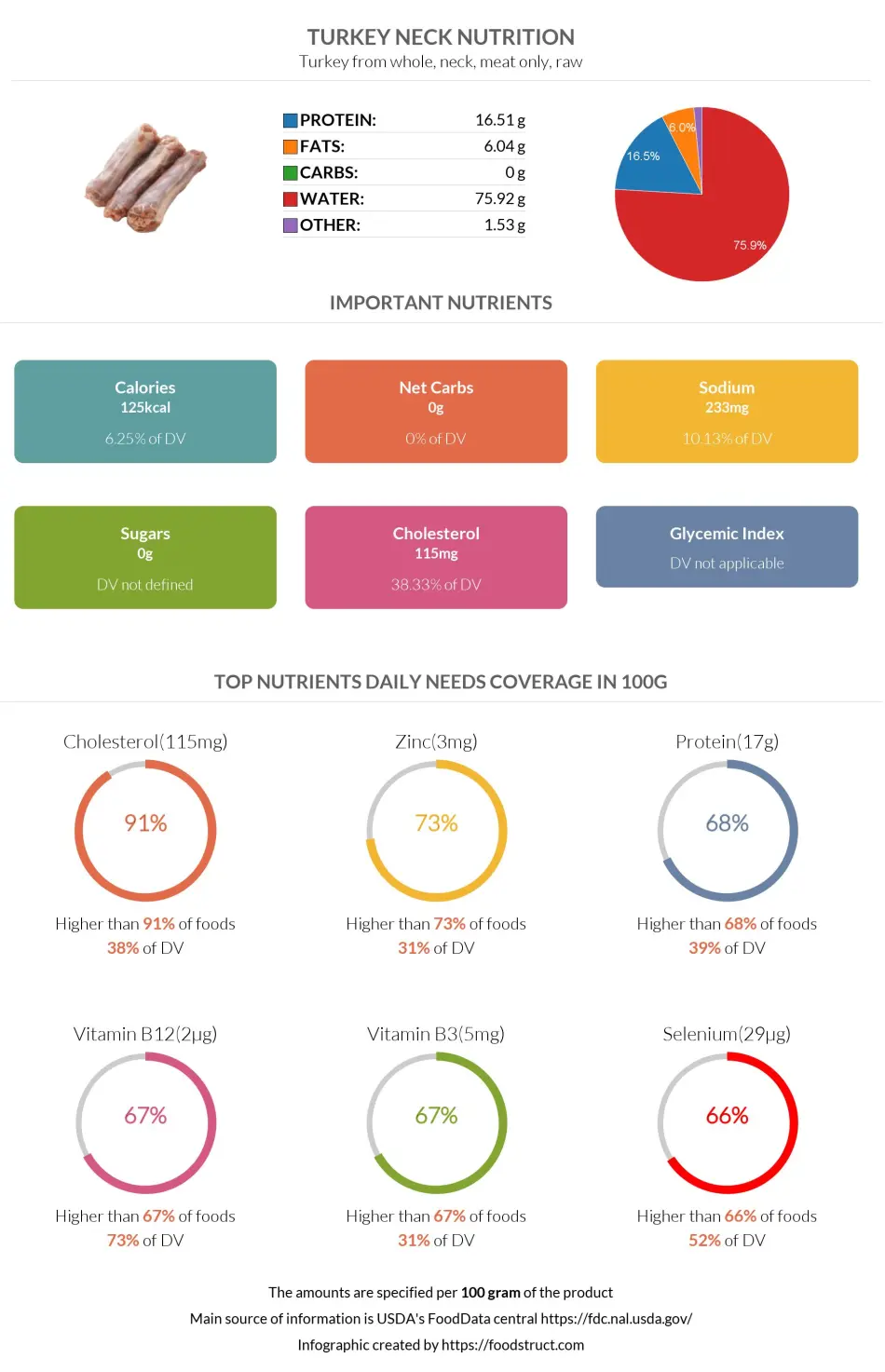
Infographic link
References
All the values for which the sources are not specified explicitly are taken from FDA’s Food Central. The exact link to the food presented on this page can be found below.
